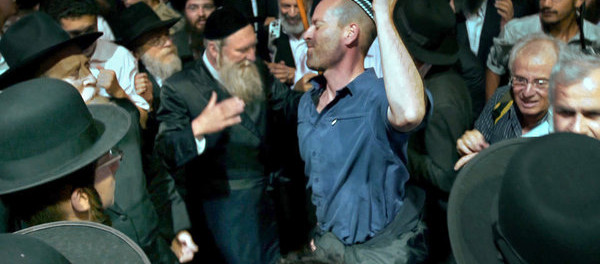Film Review of Kabbalah Me : The Personal Journey of a Kabbalah Convert
Kabbalah Me chronicles the spiritual quest of filmmaker Steven Bram. Early on in the film he reveals that although he’s always been proud to be Jewish that as he was approaching 50 years of age he started feeling as if something was missing in his life. He decided to look back and examine his religious roots as well as educate himself about the mystical branch of Judaism known as kabbalah.
Perhaps most modern film goers have heard about kabbalah due to its popularity with celebrities such as Madonna, Demi Moore, and Britney Spears. In fact kabbalah has actually been around for centuries and is derived from the Torah and Talmud. For much of its history, however, only an elite group of Talmud scholars were permitted to study this mysterious and complex belief system.
During the course of the documentary Steven Bram speaks with a number of rabbis, Hasidic leaders, and an array of kabbalah scholars. Among the men (apparently kabbalah is very male-centric) interviewed in the film are Rabbi Adam Jacobs, Rabbi Yitzchak Schwartz, David Friedman, Rabbi David Aaron, Rabbi David Ingber, and Avraham Loewenthal.
One of the most insightful aspects of Kabbalah Me is the way in which Bram’s new interest in Judaism and kabbalah in particular affects his wife, Miriam, and their two children. Although Miriam is Jewish she doesn’t subscribe to strict religious doctrine but rather has chosen to embrace a more broad based spiritual view. Likewise, Bram’s kids voice their concerns over the changes in their father’s lifestyle (ie. he won’t order them bacon).
Kabbalah Me includes plenty of scenes featuring one-on-one interviews, religious celebrations and events, as well as intimate moments featuring Bram’s personal exploration of kabbalah. Unfortunately despite all the material presented in the film the documentary misses the mark in terms of providing viewers with a real sense of what kabbalah really is. Viewers are given some basic history and a few facts but it all seems to be on a superficial level. Although film goers are able to witness a variety of the religious practises central to Hasidic Judaism, the actual daily rituals of kabbalah remain a mystery.
Another problem with Kabbalah Me is how it follows a rather clichéd format. First we met Bram, a disillusioned and non-observant Jew who’s suffering through a stereotypical mid-life crisis. Then Bram decides to examine his roots and seeks out religious guidance from a variety of Jewish leaders and scholars. Another cliché involves Bram being told that he really needs to go to the Holy Land. He then embarks on a solo trip to Israel in search of faith and truth. Does that mean that the filmmaker believes that in order to become a “real” Jew one has to go to Israel? By that reasoning do “real” Buddhists have to travel to Tibet or India? Must Christians visit Bethlehem? If you really have true religious belief shouldn’t you be able to experience and feel a connection to God anywhere…just a thought.
On a positive note the DVD includes a number of interesting extras including shorts on kabbalah and subjects such as good and evil, science, women, and meditation.
Kabbalah Me is available March 24 from First Run Features.






